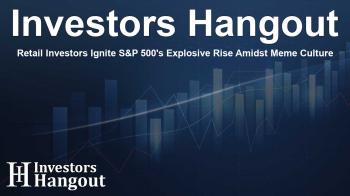Retail Investors Ignite S&P 500's Explosive Rise Amidst Meme Culture

The Retail Market Surge
U.S. equities have reached unprecedented heights, driven largely by the fervent enthusiasm of retail traders. Both the S&P 500 and Nasdaq are on the rise, with individual investors actively participating by purchasing call options and targeting heavily shorted stocks.
Recent reports suggest that retail inflows into global equities have surged, with Barclays estimating that more than $50 billion has entered the market. Unlike institutional investors who often take a more disciplined, earnings-focused approach, retail investors seem to be driven by speed, sentiment, and sheer excitement.
Market Sentiment and Retail Momentum
As the market continues its upward trajectory, Garrett DeSimone, head of quantitative research at OptionMetrics, noted that the prevailing sentiment appears to be favoring risk. "Everything is kind of risk on," he said, highlighting how retail trading dynamics may have shifted from those seen in prior years.
If historical patterns are any indication, the rush towards certain stocks, reminiscent of previous meme stock surges, may lead to erratic price movements driven more by social media buzz than by underlying business fundamentals. Popular stocks like Kohl’s and Opendoor have seen significant price swings in short periods, drawing parallels to prior explosive growth experienced by companies like AMC and GameStop.
The Echoes of 2021
Current trends mirror the frenzied trading witnessed during the meme stock mania of 2021. Stocks like Kohl's, which doubled in pre-market trading, have displayed similar traits to those that previously attracted retail investors. With a staggering short interest of 50%, these types of stocks attract considerable attention from individual traders.
Opendoor, for instance, has soared over 300% in value within a handful of days, despite facing ongoing operational challenges. This behavior is indicative of the speculative nature underlying current trading activity, reminiscent of meme stocks past.
The Inverted Interest of Institutional Investors
While retail traders capitalize on potential gains from short squeezes, institutions appear increasingly cautious. According to the latest survey by Bank of America, a mere 23% of asset managers anticipate U.S. equities outperforming over the next five years. In contrast, a significant majority are now favoring international stocks for growth, reflecting a diverging sentiment between retail and institutional investors.
The same survey reveals that 36% of investors are currently underweight in U.S. equities, with significant positioning in eurozone and emerging markets. This indicates a growing discontent with the current valuation metrics of the S&P 500, which is trading at a lofty 22.5 times its forward earnings—a far cry from its historical average.
Potential Implications for Future Investors
With concerns about valuation and geopolitical uncertainties rising, institutions are exercising caution rather than diving headfirst into this upward market. The stark contrast between retail enthusiasm and institutional reticence raises questions regarding the sustainability of this market rally. As speculative trends gain momentum among retail investors, it remains critical for individuals to balance excitement with prudence.
Frequently Asked Questions
What is driving the current rise in the S&P 500?
The surge is primarily fueled by retail traders actively purchasing heavily shorted stocks and call options, driven more by sentiment than fundamentals.
How does retail trading differ from institutional trading?
Retail trading often focuses on momentum and sentiment, while institutional trading typically relies on earnings data and market fundamentals.
What stocks are currently trending among retail investors?
Stocks like Kohl's, Opendoor, and Krispy Kreme have been catching the eye of retail traders due to their high volatility and potential for short squeezes.
Are institutional investors concerned about the market?
Yes, many institutional investors are exhibiting caution, with a significant number bet on international stocks rather than U.S. equities.
What implications does this have for future market movements?
The divergence in sentiment between retail and institutional investors could lead to increased volatility and uncertain market conditions moving forward.
About The Author
Contact Logan Wright privately here. Or send an email with ATTN: Logan Wright as the subject to contact@investorshangout.com.
About Investors Hangout
Investors Hangout is a leading online stock forum for financial discussion and learning, offering a wide range of free tools and resources. It draws in traders of all levels, who exchange market knowledge, investigate trading tactics, and keep an eye on industry developments in real time. Featuring financial articles, stock message boards, quotes, charts, company profiles, and live news updates. Through cooperative learning and a wealth of informational resources, it helps users from novices creating their first portfolios to experts honing their techniques. Join Investors Hangout today: https://investorshangout.com/
The content of this article is based on factual, publicly available information and does not represent legal, financial, or investment advice. Investors Hangout does not offer financial advice, and the author is not a licensed financial advisor. Consult a qualified advisor before making any financial or investment decisions based on this article. This article should not be considered advice to purchase, sell, or hold any securities or other investments. If any of the material provided here is inaccurate, please contact us for corrections.

